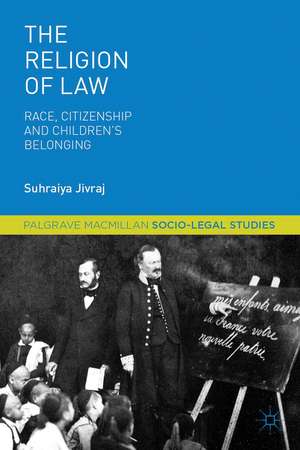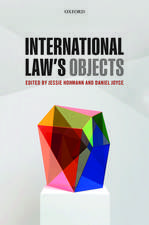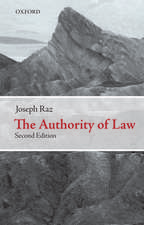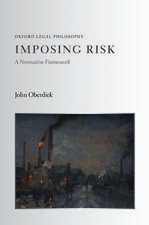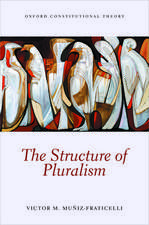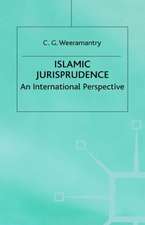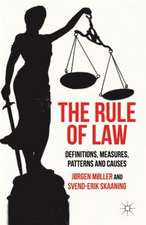The Religion of Law: Race, Citizenship and Children's Belonging: Palgrave Socio-Legal Studies
Autor S. Jivrajen Limba Engleză Hardback – 10 sep 2013
The first case study focuses on child welfare cases and reveals how the boundaries between race and theological notions of religion as belief and practice are blurred. Non-Christians are also often perceived as uncivilized but also, at times, racial otherness can be erased and assimilated. The second examines religion in education and the increasing focus on 'common values'. It demonstrates how non-Christian faith schools are deemed as in need of regulation, while Christian schools are the benchmark of good citizenship. In addition, values discourse and citizenship education provide a means to 'de-racialise' non-Christian children in the ongoing construction of the nation.
Central to this analysis is a focus on religion as a socio-political, contingent, fluid and invented concept.
| Toate formatele și edițiile | Preț | Express |
|---|---|---|
| Paperback (1) | 384.86 lei 6-8 săpt. | |
| Palgrave Macmillan UK – 27 noi 2015 | 384.86 lei 6-8 săpt. | |
| Hardback (1) | 389.88 lei 6-8 săpt. | |
| Palgrave Macmillan UK – 10 sep 2013 | 389.88 lei 6-8 săpt. |
Din seria Palgrave Socio-Legal Studies
-
 Preț: 234.50 lei
Preț: 234.50 lei -
 Preț: 197.34 lei
Preț: 197.34 lei -
 Preț: 385.84 lei
Preț: 385.84 lei - 18%
 Preț: 891.96 lei
Preț: 891.96 lei - 15%
 Preț: 580.82 lei
Preț: 580.82 lei - 15%
 Preț: 644.18 lei
Preț: 644.18 lei - 15%
 Preț: 469.91 lei
Preț: 469.91 lei -
 Preț: 424.43 lei
Preț: 424.43 lei - 15%
 Preț: 471.37 lei
Preț: 471.37 lei - 18%
 Preț: 730.47 lei
Preț: 730.47 lei - 15%
 Preț: 581.65 lei
Preț: 581.65 lei - 15%
 Preț: 572.48 lei
Preț: 572.48 lei - 15%
 Preț: 639.25 lei
Preț: 639.25 lei - 15%
 Preț: 644.95 lei
Preț: 644.95 lei - 15%
 Preț: 643.00 lei
Preț: 643.00 lei - 15%
 Preț: 581.14 lei
Preț: 581.14 lei - 15%
 Preț: 640.88 lei
Preț: 640.88 lei - 18%
 Preț: 788.90 lei
Preț: 788.90 lei - 15%
 Preț: 588.18 lei
Preț: 588.18 lei - 18%
 Preț: 788.72 lei
Preț: 788.72 lei -
 Preț: 200.30 lei
Preț: 200.30 lei - 18%
 Preț: 891.96 lei
Preț: 891.96 lei - 15%
 Preț: 703.06 lei
Preț: 703.06 lei - 15%
 Preț: 703.85 lei
Preț: 703.85 lei -
 Preț: 389.49 lei
Preț: 389.49 lei -
 Preț: 445.12 lei
Preț: 445.12 lei -
 Preț: 389.70 lei
Preț: 389.70 lei - 18%
 Preț: 786.84 lei
Preț: 786.84 lei - 15%
 Preț: 644.69 lei
Preț: 644.69 lei - 18%
 Preț: 731.10 lei
Preț: 731.10 lei -
 Preț: 390.63 lei
Preț: 390.63 lei -
 Preț: 291.67 lei
Preț: 291.67 lei - 15%
 Preț: 700.29 lei
Preț: 700.29 lei - 18%
 Preț: 732.70 lei
Preț: 732.70 lei -
 Preț: 234.35 lei
Preț: 234.35 lei -
 Preț: 394.51 lei
Preț: 394.51 lei -
 Preț: 486.21 lei
Preț: 486.21 lei
Preț: 389.88 lei
Nou
Puncte Express: 585
Preț estimativ în valută:
74.60€ • 78.10$ • 61.73£
74.60€ • 78.10$ • 61.73£
Carte tipărită la comandă
Livrare economică 05-19 aprilie
Preluare comenzi: 021 569.72.76
Specificații
ISBN-13: 9781137029270
ISBN-10: 1137029277
Pagini: 195
Ilustrații: XV, 195 p.
Dimensiuni: 155 x 235 x 18 mm
Greutate: 0.46 kg
Ediția:2013
Editura: Palgrave Macmillan UK
Colecția Palgrave Macmillan
Seria Palgrave Socio-Legal Studies
Locul publicării:London, United Kingdom
ISBN-10: 1137029277
Pagini: 195
Ilustrații: XV, 195 p.
Dimensiuni: 155 x 235 x 18 mm
Greutate: 0.46 kg
Ediția:2013
Editura: Palgrave Macmillan UK
Colecția Palgrave Macmillan
Seria Palgrave Socio-Legal Studies
Locul publicării:London, United Kingdom
Cuprins
Introduction.- 1. Conceptualising Law's Religion: Socio-Legal Perspectives.- 2. Interrogating Law's Religion: Critical Perspectives.- 3. Non-Christianness in Adoption and Child Welfare Cases: Prioritising Racialised Religion.- 4. Orientalism, Belonging and Nationhood.- 5. Religion in Education: Christian legacy, Orientalist Positioning and Common Values.- 6. Faith in Schools: Racialised Religion, Community Cohesion and Belonging.- Conclusion.
Recenzii
“The Religion of Law: Race, Citizenship and Children’s Belonging, is a welcome addition to the overarching category of work which we might still describe loosely as law and religion but it is a book which has in its essence ideas of difference and distinction. … this book is a detailed study of the many different ways in which religion might be constructed or conceptualized. … Jivraj’s book is rich and multilayered, weaving together many ideas and issues … .” (Jane Mair, Feminist Legal Studies, Vol. 25, 2017)
Notă biografică
Suhraiya Jivraj is a Lecturer in Law at Kent Law School, University of Kent, UK.
Textul de pe ultima copertă
How is religion, particularly non-Christianness, conceptualised and represented in English law? What is the relationship between religion, race, ethnicity and culture in these conceptualisations? What might be the socio-political effects of conceptualising religion in particular ways? This book addresses these key questions in two areas of law relating to children.
The first case study focuses on child welfare cases and reveals how the boundaries between race and theological notions of religion as belief and practice are blurred. Non-Christians are also often perceived as uncivilized but also, at times, racial otherness can be erased and assimilated. The second examines religion in education and the increasing focus on 'common values'. It demonstrates how non-Christian faith schools are deemed as in need of regulation, while Christian schools are the benchmark of good citizenship. In addition, values discourse and citizenship education provide a means to 'de-racialise' non-Christian children in the ongoing construction of the nation.
Central to this analysis is a focus on religion as a socio-political, contingent, fluid and invented concept.
The first case study focuses on child welfare cases and reveals how the boundaries between race and theological notions of religion as belief and practice are blurred. Non-Christians are also often perceived as uncivilized but also, at times, racial otherness can be erased and assimilated. The second examines religion in education and the increasing focus on 'common values'. It demonstrates how non-Christian faith schools are deemed as in need of regulation, while Christian schools are the benchmark of good citizenship. In addition, values discourse and citizenship education provide a means to 'de-racialise' non-Christian children in the ongoing construction of the nation.
Central to this analysis is a focus on religion as a socio-political, contingent, fluid and invented concept.
Caracteristici
A growing subject, of interest across a range of academic disciplines
